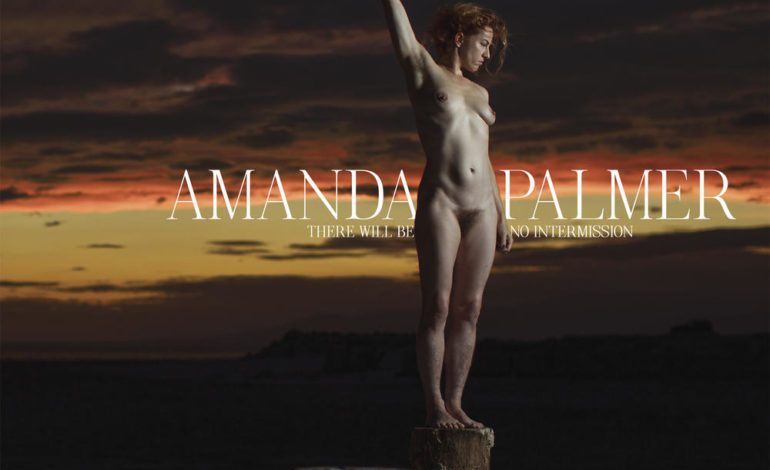

Vocally driven & auditorily stimulating
Amanda Palmer’s There Will Be No Intermission challenges audiences by breaking boundaries both visually and auditorily–twenty tracks with an undefined genre binding them together into an album with its own conscience. The album cover speaks volumes—a naked Palmer who shows absolutely no vulnerability. The image is unapologetically natural, with hair in all the places women are taught from a young age to shave. Her muscular arm reaches above head holding a steel sword with the vulgar security that masculinity affords. Amanda Palmer looks gloriously undefeatable.
The intro track “All the Things” begins with church organ music and deep rising bass. These symphonic qualities are accompanied by chiming xylophone and gentle melodies soothing the listener and drawing them in. Palmer drives the melody in “The Ride” supported by a backdrop of simple piano, and the lyrics “It’s just a ride / You’ve got the choice / To get off any time / That you like” speak like a relatable, working definition of life. The syncopated rhythm in “Drowning in the Sound” masters contemporary jazz-rock, with synth chorus backing up Palmer’s falsetto rap raising arms to, or with, society: “And the temple is a prison / And the prison’s overcrowded / And the inmates know it’s flooding / And the body politic is getting sicker by the minute / And the media’s not fake / It’s just very / Inconvenient.” Palmer wasn’t lying when she said there would be no intermission. She never loses momentum, and she never holds back.
The ballad of candid trust “The Thing About Things” speaks of loss, but material loss rather than emotional loss. With strumming just as candid as her voice, Palmer’s instrumental touch is less intentional and more intuitive as her voice becomes a material possession—one she cannot lose. Without any pretension, Palmer reaches deep into her emotional reservoir in “Judy Blume” as a thank-you to the controversial youth-fiction author who shaped her unapologetic personality and interior headspace as a musician.
What is so fascinating about Palmer’s vision is how the orchestral interludes seem like symphony excerpts displaced into There Will Be No Intermission with creative precision. The album-titled-interlude “There Will Be No Intermission” resembles how confrontational Palmer can be without using words. Palmer crosses genres and musical eras with comfortable ease—it’s impossible to question her artistic vision because her choices seem natural and deliberate.
Palmer sounds exhausted from a career and lifetime of explaining herself, but There Will Be No Intermission is the last word in the conversation. There are no intermissions to interrupt her artistic statement—there’s no dialogue for argumentation. “Machete” cuts into your eardrums with staccato, reckless intention. But she won’t let you sit comfortably in this rhythm, kicking you back into a rocking chair and swaying you into a breathing-paced solitude bliss. The track contradicts itself with melodramatic tempo changes and lyrical aggression; it’s chilling.
There Will Be No Intermission provokes the ignorant and questions the naive. Amanda Palmer tells it like it is, and she is unapologetically confident. Regardless of whether the album falls into your listening genre or makes it onto your most recent playlist, it is undoubtedly true that Amanda Palmer’s music is immortally inspiring. The closing track of the album “Death Thing” puts There Will Be No Intermission into perspective, but this review won’t tell you how or why. You have to listen for yourself and experience the project of art, honesty and emotional excavation.

